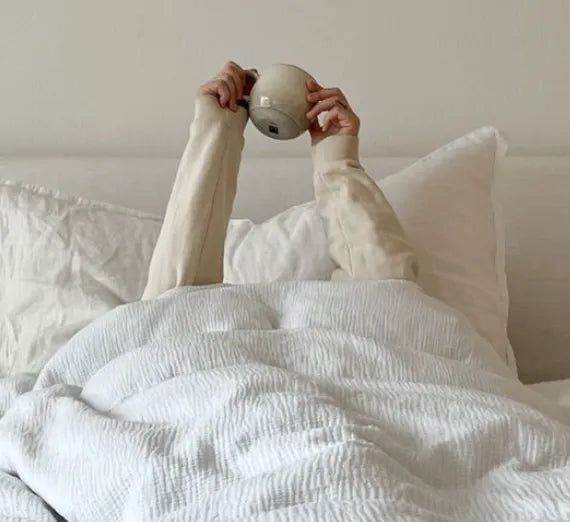Hi, I’m Anna. Sleep used to be my sanctuary—a time to recharge and reset. But through my work at The SABI, I’ve realised how many women lose that sense of peace when menopause insomnia strikes. Nights are interrupted by restlessness, hot flushes, and endless tossing and turning, leaving you feeling drained before the day even begins.
At The SABI, Hilary and I are committed to helping women understand the connection between hormones and sleep. Menopause insomnia is deeply tied to the natural changes your body is going through, but with the right strategies, you can create balance and find relief.
The Role of Hormones in Menopause Insomnia
Your hormones—particularly oestrogen, progesterone, and cortisol—play essential roles in regulating sleep. When these hormones fluctuate during menopause, the effects ripple through your nights, leading to persistent insomnia and disrupted rest.
1. Oestrogen and Restful Sleep
Oestrogen influences serotonin production and regulates your body’s temperature. When oestrogen levels drop during menopause:
-
Night Sweats and Hot Flushes: Your body’s internal thermostat becomes overly sensitive, leading to frequent overheating that wakes you up.
-
Restlessness: Lower serotonin levels can make it harder to feel calm and transition into sleep.
2. Progesterone: The Calming Hormone
Progesterone has a sedative effect on the brain, helping you relax and fall asleep. As levels decline during menopause:
-
Difficulty Falling Asleep: Without the calming influence of progesterone, your mind and body can struggle to settle.
-
Fragmented Sleep: Lighter, less restorative sleep becomes more common, compounding fatigue.
3. Cortisol and Sleep Disruption
Cortisol, the stress hormone, often increases during menopause. Elevated cortisol levels can:
-
Delay Sleep Onset: Racing thoughts and heightened alertness make it hard to unwind.
-
Interrupt Deep Sleep: High cortisol prevents your body from reaching the restorative stages of sleep, intensifying the effects of menopause insomnia.
How to Balance Hormones and Improve Sleep
While hormonal changes are a natural part of menopause, there are effective strategies to manage their impact and find relief from insomnia.
1. Sip on a Calming Herbal Tea
An all-natural adaptogenic sleep tea, like Our Calming Tea, is designed to counteract hormonal imbalances that disrupt sleep. Its soothing ingredients include:
-
Lavender and Chamomile: Reduce stress and promote relaxation.
-
Passionflower and Lemon Balm: Stabilise mood, lower cortisol, and calm hormonal restlessness.
-
Oat Straw: Gently supports the nervous system, easing tension and stress.
This herbal sleep remedy is an easy way to support your body naturally and create a calming bedtime ritual.
2. Cool Your Sleep Environment
Hot flushes and night sweats are some of the most common culprits behind menopause insomnia. To stay cool and comfortable:
-
Keep your bedroom at 16–18°C (60–65°F).
-
Use breathable, natural fabrics for bedding and pyjamas.
-
Consider a cooling pillow or mattress topper for added relief.
3. Practise Evening Mindfulness
Relaxation techniques are key to reducing cortisol and preparing your body for sleep. Pair these practices with a cup of Our Calming Tea to amplify their effects:
-
Meditation: A few minutes of focused breathing can lower stress levels.
-
Gentle Yoga: Stretching helps release muscle tension and calm the mind.
-
Journaling: Writing down your thoughts clears mental clutter and promotes relaxation.
4. Nourish Your Hormones with Food
Certain nutrients can support hormonal balance and reduce the symptoms of menopause insomnia:
-
Phytoestrogens: Found in flaxseeds, soy, and lentils, these mimic oestrogen to help stabilise mood and temperature.
-
Magnesium: Supports melatonin production and muscle relaxation. Include leafy greens, almonds, and sunflower seeds in your diet.
-
Vitamin B6: Found in bananas and avocados, B6 supports serotonin production, improving sleep quality.
Finding Balance and Peaceful Sleep
Menopause insomnia may feel overwhelming, but understanding the root cause—the hormonal fluctuations your body is navigating—can be empowering. By incorporating small, intentional steps, like sipping an adaptogenic herbal tea or embracing mindfulness, you can begin to restore balance and rediscover restful nights.
At The SABI, we believe every woman deserves to feel supported through this transition. Sleep is not just about rest—it’s about waking up feeling energised and ready to embrace life’s moments.
References
-
National Institutes of Health: Hormonal Fluctuations and Sleep Quality (https://pubmed.ncbi.nlm.nih.gov/19707017/)
-
Journal of Herbal Medicine: Chamomile and Lavender for Sleep Support (https://pubmed.ncbi.nlm.nih.gov/32066548/)
-
Journal of Sleep Research: Managing Menopause Insomnia Naturally (https://pubmed.ncbi.nlm.nih.gov/29281225/)
HORMONAL & PROUD
Created as a brand to help women navigate the toughest moments in pregnancy, childbirth, postpartum — and practically every stage of life –– The SABI aims to change the narrative around our hormones from one of taboo, embarrassment, and loneliness to awareness and pride. As more than a wellness brand, The SABI offers a carefully-crafted line of products to carry you through your hormonal journey, including rituals, supportive tools, and ancient herbal remedies that have been tested time and time again by women and now come backed by medicine. The SABI is a blend of science and nature conceived by women who have experienced the joys and deep struggles of bringing a child into the world, the pains of a heavy, difficult period, miscarriage, and difficulty conceiving.
We offer you an invitation to get to know your body and its cycles better –– an invitation to really understand what is going on inside. Learn to use your hormonal cycle to your advantage no matter your stage of life, and know that you can support and balance your hormone levels. Look for the right sources of information. Know that there is help, and know that you’re supported.
DISCLAIMER
The SABI blog and articles are not meant to instruct or advise on medical or health conditions, but to inform. The information and opinions presented here do not substitute professional medical advice or consultations with healthcare professionals for your unique situation.
















